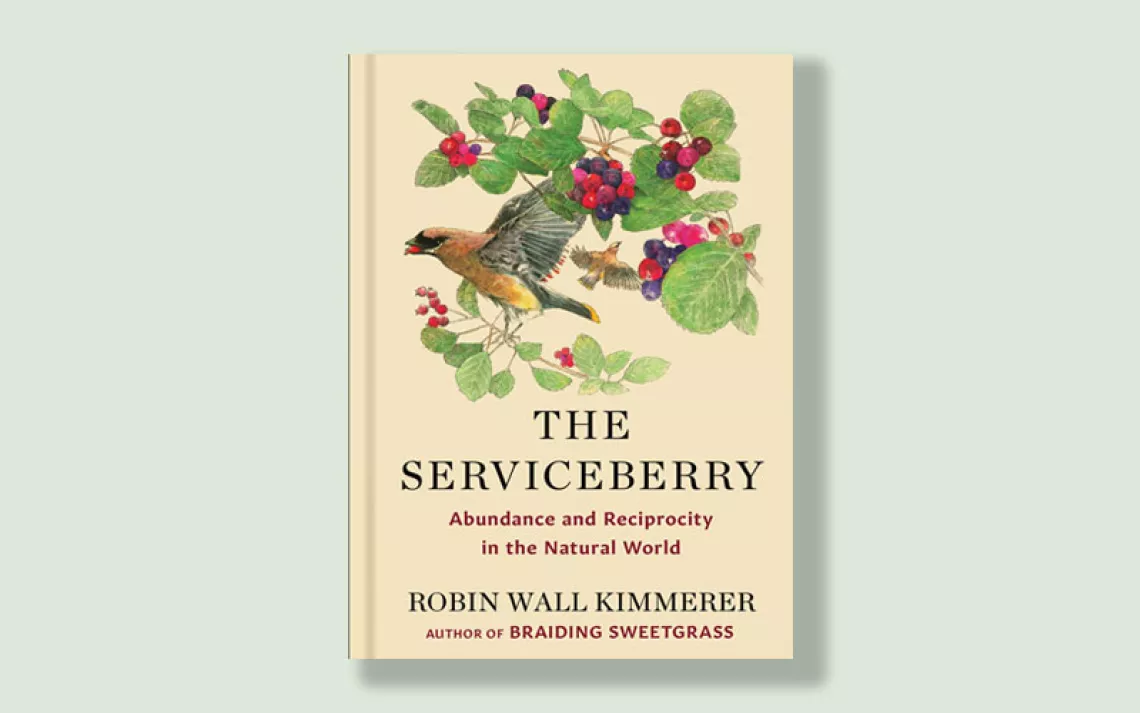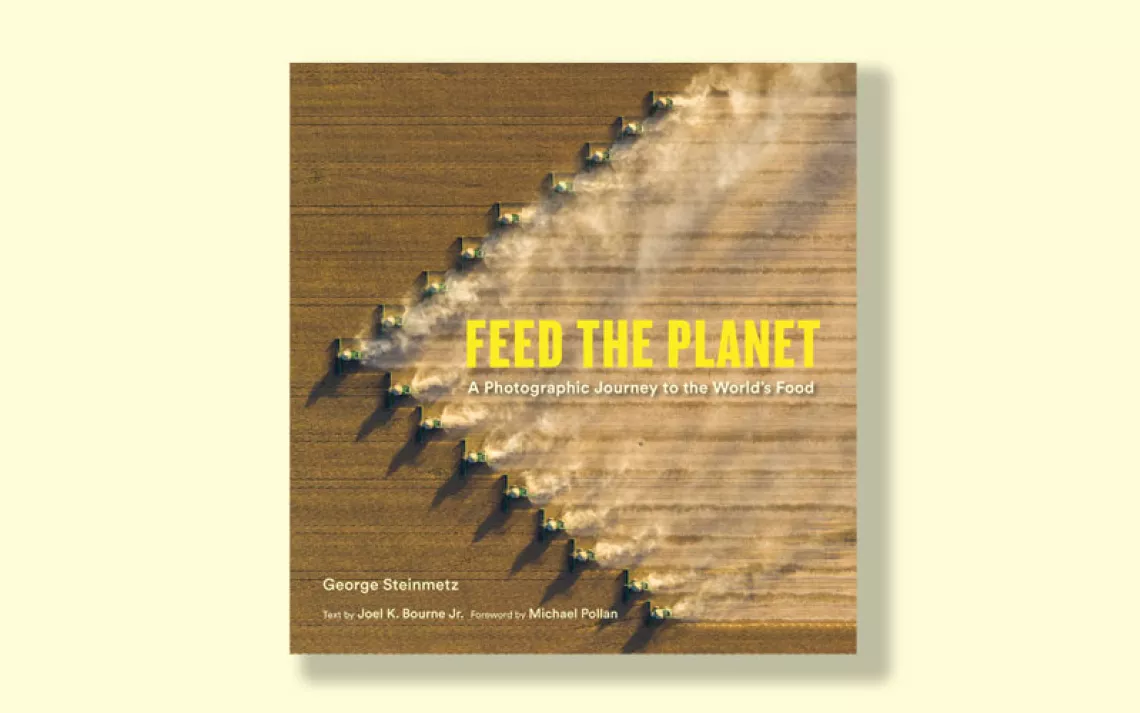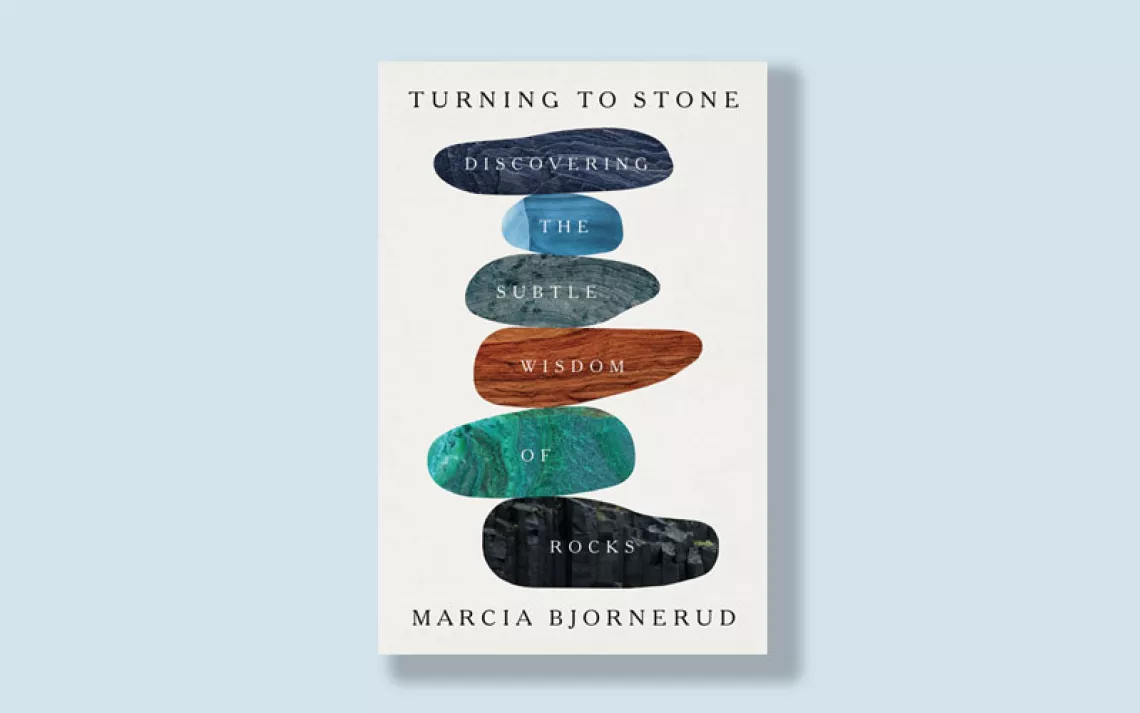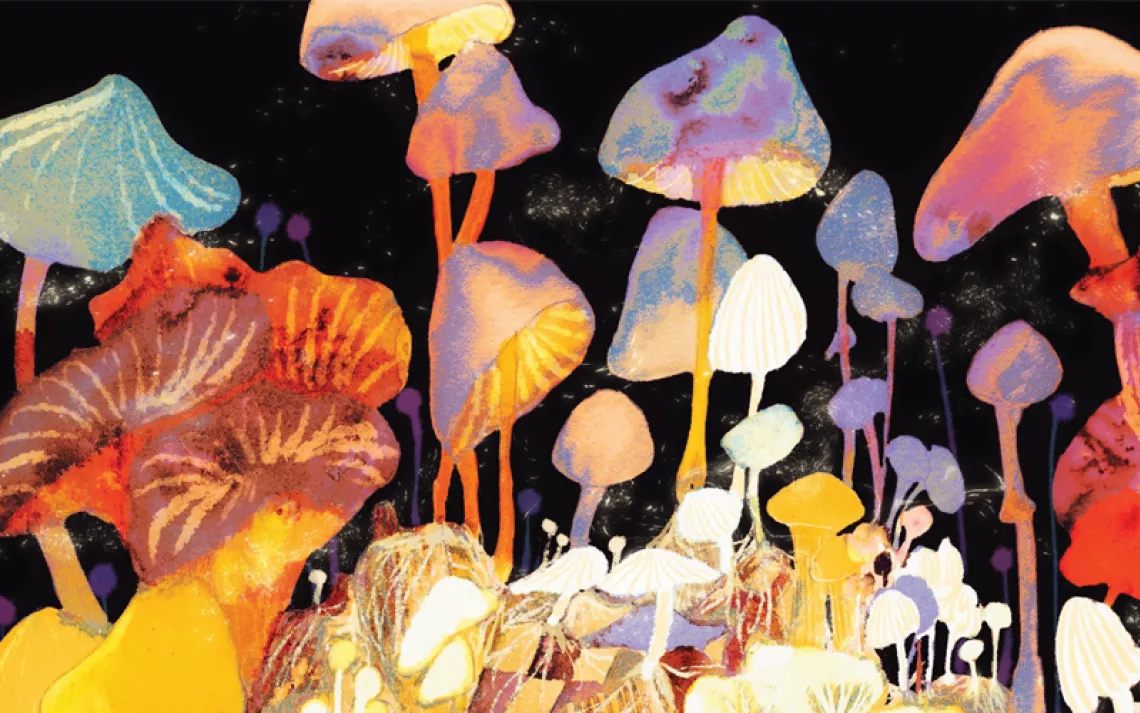15 Holiday Gifts for the Earth-Loving Bookworms in Your Life
Great reads for explorers, armchair explorers, and lovers of nature
The beauty of giving the gift of a book is that it keeps on giving: You can save it, read it again, talk to others about what you read, or pass it on. And some incredible books came out in 2018. We scoured our bookshelves for the reads that will best inspire people to explore and enjoy the planet, or that tackle difficult ecological issues. Here are 15 compelling and beautiful presents for the lucky bookworms in your life.

How can parents empower kids to make a real difference? For renowned climatologist Dr. Michael E. Mann and writer/illustrator Megan Herbert, the answer was to publish a picture book (using recycled paper, soy ink, and a printing press powered by renewable energy, of course) about a little girl named Sophia whose life is disrupted by climate change. A polar bear, a Kiribati family flooded by rising seas, a bee swarm, and a fisherman knock on her door seeking help. Sophia is understandably overwhelmed, but ultimately organizes rallies to sway people—especially policymakers—to act. The story’s sweet, rhyming prose casts the climate crisis as an opportunity rather than a bleak killjoy, and the book, titled The Tantrum That Saved the World ($28.50) comes with a glossary of climate change terms (like “coral bleaching,” “ocean acidification,” and “ice sheet”) and a poster listing solutions readers (recommended ages four to 11) can embrace with their parents: turning off unnecessary lights, shirking single-use plastic, shopping locally, and more.

Nature lovers usually have a good tale or two involving a beloved national park—and the same applies to well-known writers like Terry Tempest Williams, Bill Bryson, and John Muir. The very fetching hardcover Campfire Stories: Tales From America’s National Parks ($22) catalogs great stories from parks-goers present and past (many are culled from pioneer diaries or have been passed down through generations of Indigenous adventurers) with engaging and entertaining things to say about the legends, histories, fauna, and heroes of beloved parks including Acadia, Great Smoky Mountains, Zion, Rocky Mountains, Yellowstone, and Yosemite. It’s the perfect present for the giftee who loves a good campfire, a good tale, and unique insights into the parks they love. (Note: This popular gift is selling out fast, but Amazon does still have copies in stock.)

Back before health food stores and yoga studios entered the mainstream, some people dismissed greenies as weird, crunchy hippies and thought of style and ecology as two dichotomous worlds. But as Marci Zaroff writes in ECOrenaissance: A Lifestyle Guide for Cocreating a Stylish, Sexy, and Sustainable World ($17), looking and feeling fabulous never has to happen at the expense of the environment. A compilation of tips and tricks for how to live, primp, and shop in harmony with nature without forgoing style or luxury, the book discusses eco-chic fashion brands, planet-conscious food purveyors, and beauty standards that can sustain our ecosystems. It’s a holiday gift that’ll equip loved ones to find empowering ways to make lean, green lifestyles more elegant—and sustainable—than ever.

Go Find: My Journey to Find the Lost—and Myself ($28) is the story of the first female avalanche rescue team in the male-dominated search-and-rescue community: author Susan Purvis and her bear-faced black lab, Tasha. The latter constantly tests Susan’s determination to transform her into a working rescue dog, and the two jockey for “alpha” ranking while pursuing certifications in avalanche, water, and wilderness recovery. As they launch dozens of missions to rescue the missing and recover the remains of victims, the pair face resistance at every turn—and Susan not only learns to communicate with Tasha by seeing the world through her superior nose, but also discovers that “lostness” doesn’t only apply to being turned around on a trail. It’s a funny, snowy love story about a woman and her amazing sidekick, i.e., the perfect winter read for the canine-loving adventurers on your list.

For those adrenaline junkies in your orbit determined to make every second of life count by filling it with epic climbs, deep-water dives, and off-the-beaten-path treks, look no further than Ed Stafford’s Ultimate Adventure Guide: The Bucket List for the Brave ($25). Author Ed Stafford holds the Guiness Book of Records title as the first human to walk the length of the Amazon River, and his guide presents 125 hand-picked selections of exciting challenges (think wild camping in the Lofoten Islands, hiking French Guiana, ski-touring the Alps’ Haute Routes, and scrambling the ridges of Zion National Park). They all make for an entertaining adventure guide rife with motivational commentary, training tips, stunning photography, and handy maps. And it’ll definitely grow giftees’ bucket lists.

In a similar vein, Lonely Planet’s Epic Hikes of the World ($24) is a stunning collection of 50 first-person narratives documenting experiences along some of the world’s most spectacular treks. It features classics like Patagonia and the Pacific Crest Trail as well as a range of lesser-known day jaunts, mountain paths, and urban trails. In addition to compelling writing, each entry includes practical information about a given hike’s difficulty and accessibility as well as the best time of year to tackle it, how to get there, where to stay, and what to eat. The best part is, if you love a featured trail, the book will introduce you to others like it—meaning the book ultimately features upwards of 200 adventures. The hiking enthusiasts in your life will love having the all-in-one-place scoop on California’s Lost Coast Trail, Boston’s Freedom Trail, Italy’s Path of the Gods, and many, many more bucket-list-worthy hiking destinations.
 Keep in mind, adventure fiction is a real—and awesome—genre too. Susan Froderberg’s Mysterium ($26) was inspired by the true story of Nanda Devi Unsoeld’s tragic 1976 death while climbing her namesake mountain. Accordingly, this novel is the tale of a courageous woman, Sarasvati “Sara” Troy, who was determined to summit the peak for which she was christened, Mount Sarasvati, in honor of her mother after she perished in a mountaineering accident. Troy expeditions alongside a motley crew of scholars and mountaineers to its peak—a journey that evokes Dante’s Divine Comedy. As the air thins, the vivid prose grows increasingly surreal, and the wanderings of characters' minds all the more hallucinatory. We promise the novel lovers and mountaineers on your list will be enthralled.
Keep in mind, adventure fiction is a real—and awesome—genre too. Susan Froderberg’s Mysterium ($26) was inspired by the true story of Nanda Devi Unsoeld’s tragic 1976 death while climbing her namesake mountain. Accordingly, this novel is the tale of a courageous woman, Sarasvati “Sara” Troy, who was determined to summit the peak for which she was christened, Mount Sarasvati, in honor of her mother after she perished in a mountaineering accident. Troy expeditions alongside a motley crew of scholars and mountaineers to its peak—a journey that evokes Dante’s Divine Comedy. As the air thins, the vivid prose grows increasingly surreal, and the wanderings of characters' minds all the more hallucinatory. We promise the novel lovers and mountaineers on your list will be enthralled.

Few things in life are more satisfying than making deliciousness out of waste. In Scraps, Peels, and Stems ($23), food journalist Jill Lightner offers 70+ recipes and plenty of easy-to-implement insights into how to properly store produce, make “nose to tail” use of animal products, disregard expiration dates, and get extra mileage out of corn cobs and shrimp shells. It all makes for one lifestyle-changing, appetite-inducing read.

Whimsical watercolors, French translation, and botanical treasures like dancing vines, underground trees, and a fern that clones itself are the stuff dreams—and great gifts—are made of. Francis Hallé’s Atlas of Poetic Botany ($25) is filled with witty stories that further illustrate the author’s beautiful renderings of phenomena such as Queen Victoria’s rubber tree and flowers that exude the stench of garbage in the summer sun. Give the gardeners, francophiles, and nature lovers in your life the gift of a magical tour through the wonders of the natural world.
 Guidebooks are useful, but they don’t usually make readers want to curl up and savor every word. At least, that is, not until Wildsam guides splashed onto the scene. Written for deep travelers—the types who like to dive into a given place’s cultural context and explore its lesser-known sides—the editors behind Wildsam field guides tap local writers to explore places (like the Desert Southwest, American South, New England, and soon, the national park system) through exceptional prose and with plenty of personality. Each guidebook ($20) mixes unique illustration, archival research, long-form essays, hand-drawn maps, personal interviews with places’ biggest personalities and local heroes, and handy lists to celebrate the magic of exploration and discovery. As a result, they feel a lot more like reading Jack Kerouac’s or Edward Abbey’s notebooks than browsing your traditional tourist tome.
Guidebooks are useful, but they don’t usually make readers want to curl up and savor every word. At least, that is, not until Wildsam guides splashed onto the scene. Written for deep travelers—the types who like to dive into a given place’s cultural context and explore its lesser-known sides—the editors behind Wildsam field guides tap local writers to explore places (like the Desert Southwest, American South, New England, and soon, the national park system) through exceptional prose and with plenty of personality. Each guidebook ($20) mixes unique illustration, archival research, long-form essays, hand-drawn maps, personal interviews with places’ biggest personalities and local heroes, and handy lists to celebrate the magic of exploration and discovery. As a result, they feel a lot more like reading Jack Kerouac’s or Edward Abbey’s notebooks than browsing your traditional tourist tome.

For those giftees who appreciate nature, art, and/or meditation, look no further than Day Schildkret’s stunning Morning Altars: A 7-Step Practice to Nourish Your Spirit Through Nature ($25). The author, an educator and “earth artist,” shows readers how to use foraged flora and other natural materials to create morning altars. However, Schildkret emphasizes the importance of the creative process—in this case, a meditative practice that highlights the interconnectedness and impermanence of the natural world—over the (ephemeral in this case) final result. It’s a tome intended to spark one’s inner creativity and cultivate mindfulness—but at the same time, it’s a lush feast of earthy mandalas that’ll look great on any coffee table.
 Speaking of coffee table books, animal lovers will love getting up close and personal with the stars of lauded photographer Traer Scott’s newest collection, Radiant: Farm Animals Up Close and Personal ($25). It’s a whimsical and soulful photo collection focusing on the lives—and sparkling personalities—of rescued farm animals. Readers meet cows , pigs, and chickens galore—as well as Dolly the wooly llama, Bianca the Sicilian mini donkey, and Justice the yak. The book doesn’t shame nonvegetarians but does shine a beautiful light on those creatures generally viewed as numbers rather than individuals.
Speaking of coffee table books, animal lovers will love getting up close and personal with the stars of lauded photographer Traer Scott’s newest collection, Radiant: Farm Animals Up Close and Personal ($25). It’s a whimsical and soulful photo collection focusing on the lives—and sparkling personalities—of rescued farm animals. Readers meet cows , pigs, and chickens galore—as well as Dolly the wooly llama, Bianca the Sicilian mini donkey, and Justice the yak. The book doesn’t shame nonvegetarians but does shine a beautiful light on those creatures generally viewed as numbers rather than individuals.

If you’re a Sierra reader, you likely have some critter-loving loved ones. The Animal Lover’s Guide to Changing the World ($17) is a sweet, pragmatic guide to living a more animal-friendly life (and casts no judgment against those of us who are unwilling to infiltrate factory farms in the dead of night, or even give up bacon). At a time when wildlife populations are plummeting, the developing world is growing America-octane appetites for meat, countless animals are killed in research labs, and dogs and cats are languishing in shelters, this book shows readers how to take action (through physical and political moves as well as “clicktivism”) to create a better world for the animals we love, and for ourselves too.

For the nature lover with a sense of humor, we present The Delightful Horror of Family Birding ($17), in which birder Eli Knapp takes readers from a leaky canoe in Tanzania to a juniper titmouse’s perch at the Grand Canyon, exploring life’s deep questions along the way. This collection of fun, pithy essays weaves together Knapp’s gleaned-from-birds insights and the wide-eyed wonder his kids experience as they venture into their father’s avian world.

It may be a picture book, but the resistey grown-ups in your sphere are bound to unwrap Whose Boat Is This Boat? Comments That Don’t Help in the Aftermath of a Hurricane ($9) with childlike glee too. Authored by the staff of The Late Show With Stephen Colbert, the book was inspired by Donald Trump’s September 19, 2018, visit to New Bern, North Carolina, one of the towns ravaged by Hurricane Florence. It was there that our president showed deep concern for a boat that washed ashore by telling hurricane victims, “At least you got a nice boat out of the deal. Have a good time!” Based on the notion that such comments are appropriate only in the context of a children’s book, Whose Boat Is This Boat? is comprised entirely of quotations from Trump, post-Florence. It’s not only the first children’s book that demonstrates what not to say after a climate-change-induced natural disaster, but also a fine tongue-in-cheek lesson in empathy. Plus, 100 percent of proceeds go to hurricane relief, including Florida Disaster Fund, Foundation for the Carolinas, The One SC Fund, The North Carolina Disaster Relief Fund, and World Central Kitchen. Post a picture of yourself gifting it using the hashtags #WhoseBook, #LSSC, and/or #LateShow.
 Photo courtesy of Sam Murphy
Photo courtesy of Sam Murphy
 The Magazine of The Sierra Club
The Magazine of The Sierra Club




